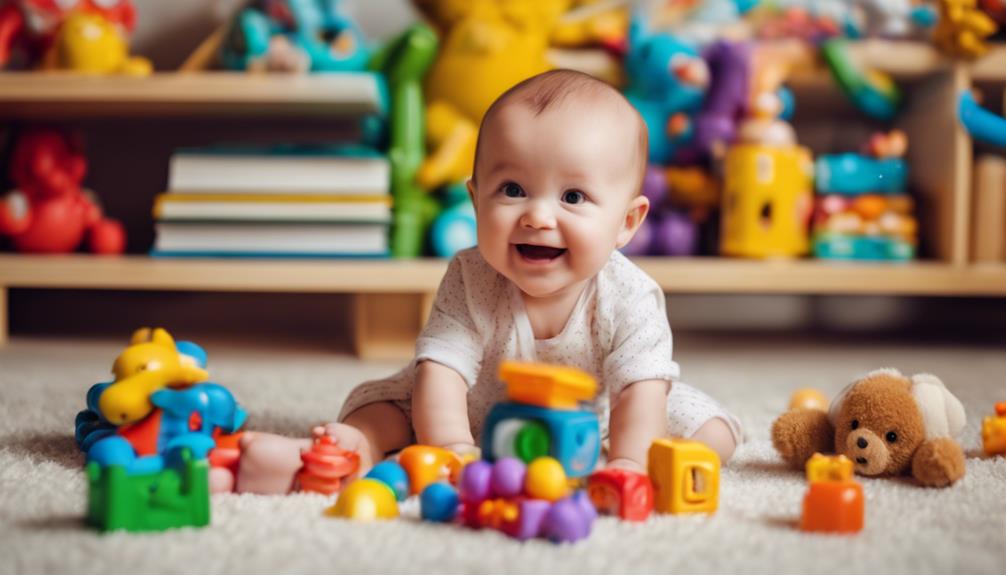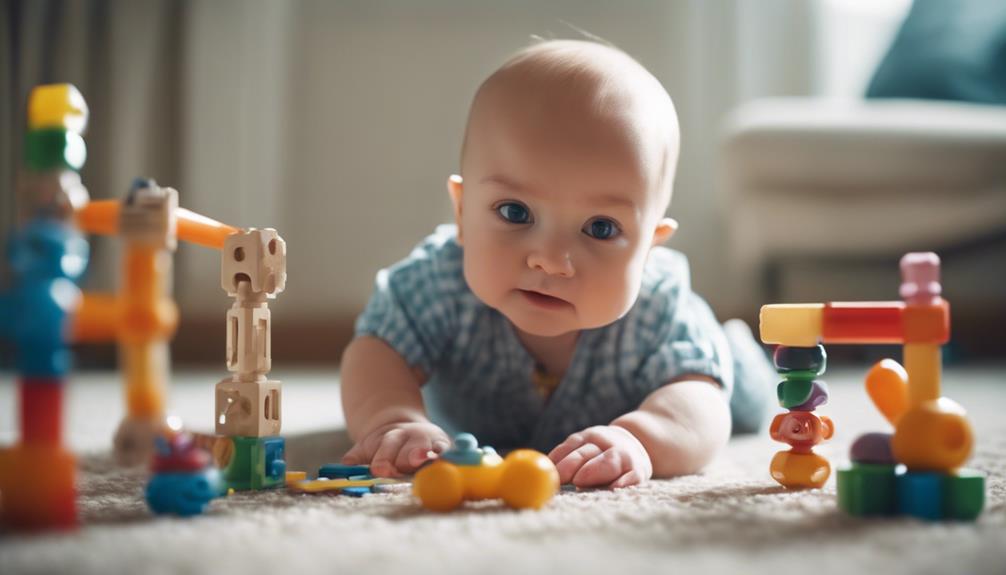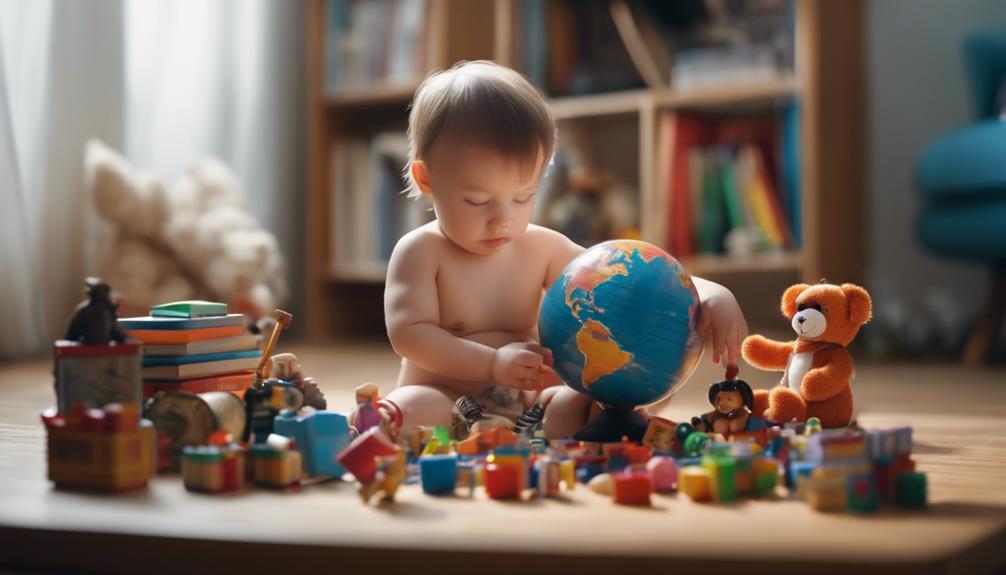To determine if a baby is fond of you, pay attention to subtle signals such as eye contact and smiling, which demonstrate interest and fondness. When seeking affection, the baby displays trust, dependency, and a longing for closeness. Cooing, babbling, and laughter convey happiness and strengthen the connection. Serene behavior, as well as indications of excitement and joy, indicate comfort and involvement. Demonstrations of love and attachment, such as hugs and skin-to-skin touch, show affection. When a baby mimics your actions, it indicates communication and bonding. These signs offer insight into the baby’s emotions. Stay observant of these subtle hints to better understand their affection.
Key Takeaways
- Extended eye contact and smiling back indicate interest and fondness.
- Reaching out for affection shows love, reliance, and a need for comfort.
- Cooing, babbling, and laughter express joy and strengthen the bond.
- Calm behavior, smiling, and cooing signify comfort and trust.
- Signs of excitement like kicking, smiling, and reaching show enjoyment and engagement.
Eye Contact and Smiling
To measure a baby's feelings towards you, observe their eye contact and smiling behavior closely. Babies start developing the ability to make eye contact early on. If your baby locks eyes with you and maintains that gaze for extended periods, it's a sign that they're interested and possibly fond of you.
Pay attention to their facial expressions as well. When you smile at a baby, and they smile back, it's a heartwarming indicator of affection. You may notice that when you look deep into your baby's eyes, they'll start smiling or even cooing in response, showing their connection with you.
Babies often use eye contact and smiling as forms of communication, especially with those they like and feel comfortable with. So, if you see your baby eagerly looking at you, responding with smiles, or mirroring your facial expressions, these are all positive signs that your baby is developing a bond with you.
Reaching Out to Be Held

Babies often express trust and affection by reaching out to be held. When a baby extends their tiny arms towards you, it's a profound display of love and reliance. This gesture goes beyond a simple physical movement; it signifies the baby's need for comfort and security that they associate with you.
By reaching out to be held, the baby is communicating their attachment and dependence on you for emotional support and reassurance. Responding to this subtle cue not only fulfills the baby's desire for closeness but also strengthens the bond between you and the little one.
It's a beautiful moment of connection where the baby's vulnerability meets your nurturing instinct, creating a safe and loving environment for them to thrive. So, when a baby reaches out to be held, embrace this opportunity to provide the comfort and care they seek, fostering a deep sense of trust and affection that will endure as they grow.
Cooing and Babbling

When a baby coos and babbles in your presence, it's their way of expressing joy and establishing a connection with you.
These vocal responses serve as cues that the baby is engaged and enjoying the interaction with you.
Encouraging these interactive babbling moments can strengthen your bond and create a positive communication loop between you and the baby.
Vocal Response Cues
Pay attention to the tone and pitch of the baby's vocalizations as they interact with you to gauge their liking and affection towards you. When a baby coos or babbles in response to your voice, it is a sign of love and comfort. These vocal responses are the baby's way of communicating with the person they love. Cooing and babbling create a positive connection between you and the baby, showing that they enjoy your presence. By encouraging these vocalizations through interaction, you can strengthen the bond you share with the baby.
| Vocal Response Cues | Significance |
|---|---|
| Cooing | Indicates comfort and affection |
| Babbling | Shows liking and positive connection |
| Tone and Pitch | Reflects the baby's feelings towards you |
| Interaction | Encourages further communication and bonding |
| Strengthening Bond | Promotes a deeper connection with the baby |
Engaging Baby Language
Engage with a baby's cooing and babbling to foster communication and strengthen your bond with them.
When a baby coos, they're expressing contentment and happiness through gentle vocal sounds.
Babbling usually begins around 6 months of age and involves repeating consonant-vowel combinations.
It's important to interact with a baby when they coo and babble as this is how they learn to communicate and practice forming sounds.
These early vocalizations play a significant role in developing pre-speech skills and lay the groundwork for language development.
Encouraging and responding to a baby's coos and babbles not only aids in their linguistic growth but also enhances the connection between caregiver and child.
Interactive Babbling Interactions
To further enhance your interaction with a baby's early vocalizations, consider actively participating in interactive babbling sessions to promote communication and bonding.
Interactive babbling involves engaging in back-and-forth vocal exchanges with your baby. This form of communication is important as babbling serves as a precursor to language development, allowing babies to practice making sounds and eventually form words.
Responding to your baby's coos and babbles not only encourages communication but also strengthens the bond between you and your little one. During these sessions, pay attention to how babies may mimic the rhythm and tone of your speech, showing their enthusiasm to engage with you.
- Engage in back-and-forth vocal exchanges with your baby.
- Help your baby practice making sounds through babbling.
- Strengthen the bond by responding to your baby's coos and babbles.
- Observe how babies may mimic the rhythm and tone of your speech.
Calm and Content Behavior

When a baby likes you, they'll often exhibit calm and content behavior, such as smiling and seeking your gaze.
This relaxed demeanor can indicate a sense of comfort and trust in your presence.
Observing these subtle cues in a baby's body language can help you understand their positive feelings towards you.
Smiling and Cooing
Smiling and cooing are clear indicators of a baby's calm and content behavior, demonstrating their affection and comfort around you. When a baby smiles at you, it's a heartwarming sign of their liking and enjoyment in your company.
The soft cooing, gentle vocalizations, and sweet babbling they do are all ways babies express their fondness towards you. These behaviors not only show their affection but also indicate that the baby feels secure and happy in your presence.
It's essential to pay attention to these subtle cues of smiling and cooing to understand the depth of the baby's attachment and comfort with you.
- Babies communicate their liking through smiling and cooing
- Smiling reflects affection and enjoyment in your presence
- Cooing and babbling are ways babies express fondness
- These behaviors signify the baby feels comfortable and happy around you
Seeking Your Gaze
Engaging in prolonged eye contact with a baby who likes you signifies a strong sense of interest and connection on their part. When they seek your gaze, it shows that they feel comfortable and secure in your presence. You'll notice the little one gazing at you with a relaxed expression, indicating contentment. This calm behavior is a subtle sign that the baby loves being around you.
As they make eye contact, you may also see them smiling or cooing, expressing their joy and positive feelings towards you. During feeding or playtime, the baby's focus on your face and eyes demonstrates their enjoyment of your attention and interaction. When you talk or sing to them and they maintain eye contact, it's a clear indication of liking and attachment.
These moments of connection through eye contact not only make the baby feel happy but also strengthen the bond between you.
Signs of Excitement or Happiness

To recognize signs of excitement or happiness in a baby, observe their body language and vocalizations when interacting with you. Here are some subtle signs to look out for:
- Kicking and waving: Babies may show their excitement by kicking their legs, waving their arms, or making joyful sounds when you're around.
- Smiling and reaching out: A baby's smile, cooing, and reaching towards you're clear indicators that they enjoy your company.
- Making eye contact: When a baby locks eyes with you, tracks your movements, or flashes a big grin, they're trying to see and learn more about you.
- Laughter and babbling: The sounds of laughter, happy babbling, or bouncing with joy are ways a baby might feel and letting you know they've come to like you.
Physical Gestures of Affection

Moreover, physical gestures of affection from a baby may include reaching out to be picked up, hugging, or snuggling against you. When your baby begins holding out their arms towards you, it signifies a deep sense of love and trust. These actions demonstrate a strong bond and attachment to you. As a caregiver, it's essential to let your baby express their affection physically.
Physical closeness, such as leaning towards you or pressing their face against you, is a clear indicator of their love. Additionally, babies may show affection through gentle pats, stroking your face, or playing with your hair. These subtle actions showcase their emotional connection with you.
Moreover, physical gestures like grabbing your finger, holding onto your clothing, or seeking skin-to-skin contact all demonstrate the strong bond your baby feels towards you. Encouraging these gestures can further strengthen your relationship and create a nurturing environment for your baby's emotional development.
Frequently Asked Questions
How Can You Tell if Your Baby Likes You?
You can tell if your baby likes you by their seeking comfort, making eye contact, smiling, and reaching out to you. Their happiness and separation anxiety when you return, as well as physical gestures like wanting to be held, show their love.
How Do I Know if My Baby Is Attached to Me?
You know your baby is attached when they seek comfort from you, get upset when you're apart, reach out for cuddles, smile and coo when you return, and use you for reassurance. Trust those sweet signs!
Can Babies Tell if You're Attractive?
Babies can sense your attractiveness as they prefer familiar, caring faces. Research shows infants as young as a few months old are drawn to symmetrical and appealing faces. But remember, your emotional bond matters most.
Can Babies Feel Attraction?
Yes, babies can feel attraction towards certain individuals based on their need for comfort, security, and love. They express this through reactions, behaviors, and seeking reassurance. Recognizing a baby's attraction involves observing their interactions closely.
Conclusion
To sum up, understanding a baby's subtle signs of affection can help strengthen your bond with them.
For example, Sarah noticed her baby's eyes lighting up and smiling whenever she entered the room, indicating a positive connection.
By paying attention to cues such as eye contact, reaching out, cooing, and content behavior, you can better gauge a baby's feelings towards you.
Remember, building a strong relationship with a baby takes time and patience, but the rewards are priceless.










